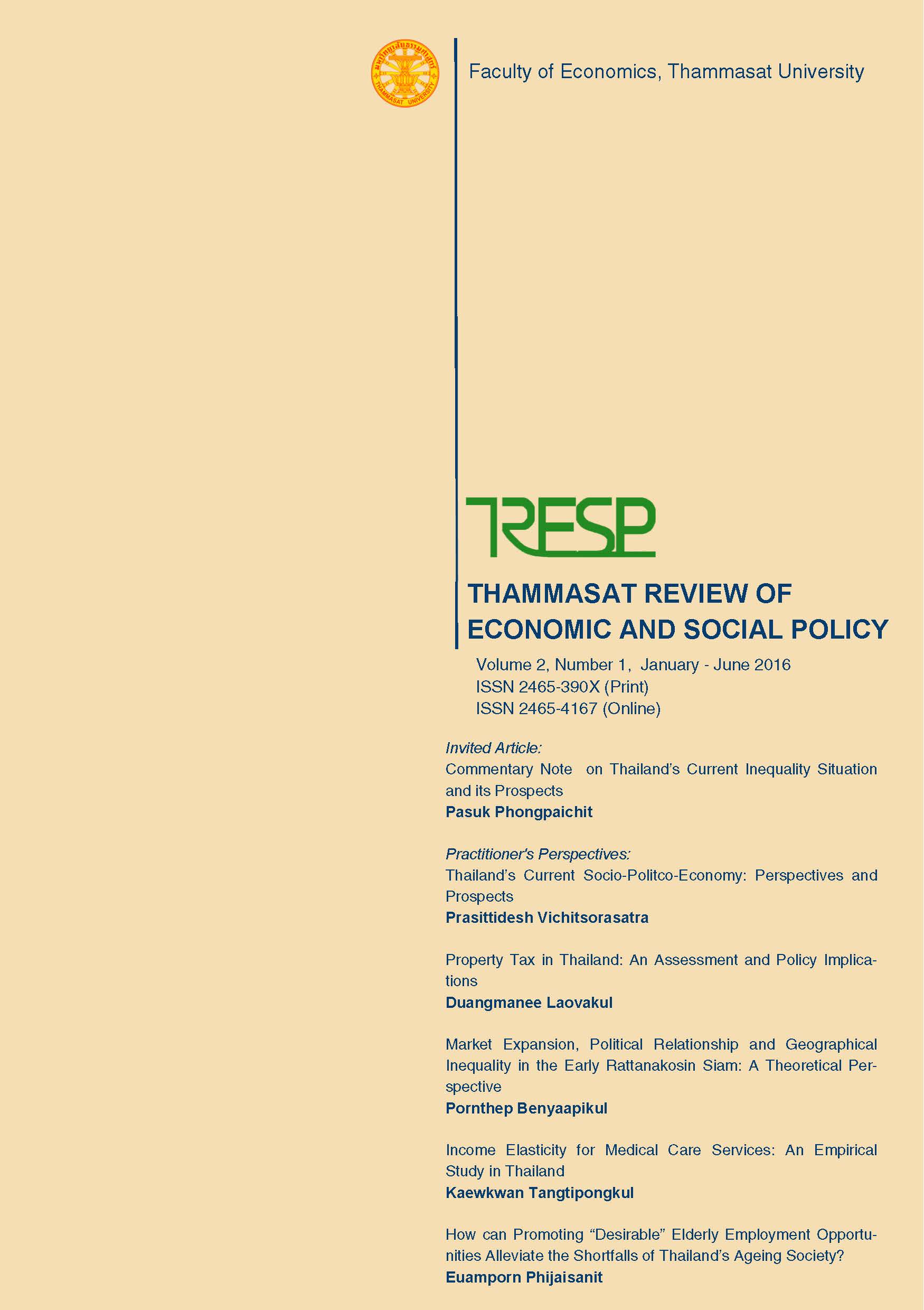Property Tax in Thailand: An Assessment and Policy Implications
DOI:
https://doi.org/10.14456/tresp.2016.3Keywords:
Land and Building Tax, inequality, fiscal decentralization, local governmentAbstract
This paper explores the ways in which the proposed new Land and Building Tax bill could be used to increase local government revenue and reduce wealth inequality in Thailand while rationalizing the current system of land taxes. After comparing the current system to the new proposed system, it finds that the new bill would be fairer, as it would be a more reasonable tax rate, and more broadly (and fairly) collected, and would do so based on current land values, not the values calculated in 1981. Additionally, by having the tax collected and used at a local level, it would promote fiscal decentralization and local governmental accountability.
References
Laovakul, D. (2012). Summary and Analysis of Draft Land and Building Tax Bill. Supported by Legislative Process Development for Supporting People Participation in Thailand Project, in Thai.
Laovakul, D. (2013). The Concentration of Wealth in Thai Society. In Towards a More Equitable Thailand: A Study of Wealth, Power and Reform Project. Supported by Thailand Research Fund, Office of the Higher Education Commission and Chulalongkorn University, conducted by Pasuk Phongpaichit, in Thai.
Laovakul, D. (2014). Land and Inheritance taxes: Who own, who pay and who benefit? Thammasat Economic Focus, No. 2, available at http://www.tef.econ.tu.ac.th/wpcontent/uploads/2015/03/02_TEF-Final-paper.pdf, in Thai.
Laovakul, D. (2016a). Concentration of Land and Other Wealth in Thailand. in Unequal Thailand: Aspects of Wealth and Power. Chapter 2. Pasuk Phongpaichit and Chris Baker (Eds), National University of Singapore Press.
Laovakul, D. (2016b). The Model for Improving Land Tax to Promote Land Distribution in Thailand. Supported by the Thailand Research Fund, in Thai.
Leenothai, S. (2014). Summary of the Main Contents of the Draft Land and Building Tax Bill or the Property Tax. Presented at a Seminar on “The Land and Building Tax or the Property Tax for Fairness and Reducing the Inequality” at Khonkaen University,December 12, 2014, in Thai.
Norregaard, J. (2013). Taxing Immovable Property Revenue Potential and Implementation Challenges. IMF Working Paper.
Office of the Council of State. Draft Land and Building Tax Bill, No. 194/2554, in Thai.
Slack, E. (2010). The Property Tax … in Theory and Practice. IMFG Working Paper 02.
Bangkokbiznews Online (2015). The Minister of Finance Prepares to Submit the Draft Land and Building Tax Bill to the Cabinet. (2015, August 9). Retrieved from http://www.bangkokbiznews.com/news/detail/660180, in Thai.
Matichon Online (2012). The Ministry of Finance Pushes Forward the Draft Land and Building Tax Bill, Revises 4 Issues and Increases the Tax Ceiling Rates. (2012, September 11). Retrieved from http://www.matichon.co.th/news_detail.php?newsid=1347341486, in Thai.
Ministry of Finance (2016). Draft Land and Building Tax B.E…… The Ministry of Finance Press Release. (2016, June 7). Retrieved from http://www.fpo.go.th/FPO/index2.phpmod=Content&file=contentview&contentID=CNT0015818&categoryID=CAT0000153, in Thai.



